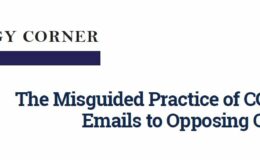Can a Lawyer Get a Copy of a Transcript Without Paying Court Reporter? (The Debate Continues)
- By : Cbh
- Category : Ethics, Uncategorized
There is often an unspoken understanding that lawyers who attend hearings which are transcribed need to pay the court reporter to get a copy.
Thus, if there are 10 parties to a lawsuit and everyone wants a copy of a 15-minute hearing transcript, court reporters often take the position that the party ordering the transcript pays an “ordering fee” and all nine other parties then pay lesser, but still pricey, fee for “copies.” Pricing varies from court reporter to court reporter, but often a “copy” of a transcript is not at the Kinko’s-level copy charges of 5-10 cents per page. It’s often over $1 per page, perhaps significantly so.
We touched upon this issue in an earlier post where we discussed posting deposition videos on YouTube (which also skirted the issue of sharing expert depositions). A subtle theme in that “white paper” at issue in the prior post was that some court reporters lay a claim to transcripts. Given that court reporters put in long hours in that boring deposition which was meaningful only to you and produce quality work, you can see the reasonable origin of their thinking. But the law may not be on their side.
The Tenth Circuit Court of Appeal issued an unpublished opinion on this very same issue, specifically a battle over about $4,000 in court reporter fees. As the court warns, that order is not precedent but simply persuasive for non-party court watchers. The case is United Transportation Union Local 1745 et al. v. City of Albuquerque.
The case involved an overtime dispute between employees (union) and employer (city). Of note, that claim is a statutory one which includes a right to attorney’s fees. During litigation, hearings before a special master occurred and the City order the transcripts. The plaintiff lawyer did not order a copy. Instead, he sought to have the court compel the City to file the transcripts so he could pay the clerk of the court regular photocopy charges for the transcript rather than pay a higher fee charged by the court reporter. That was denied. He then obtained the transcripts by making a public records request (presumably, these transcripts were not time sensitive). Clever. Again, that way he would pay the City for their photocopy charges and avoid paying a higher charge to the reporter.
Bottom line: the court held that the court reporter could not demand a fee under the circumstances.
The court wrote, “We have found no authority to justify requiring plaintiffs… to pay a fee to a court reporter for transcript copy the reporter did not make but, rather, that they legally obtained from another source by independent means. On the contrary, both broad principles and particular holdings undermine the notion that court reporters may demand a ‘missed fee’ whenever someone obtains a copy of a transcript that can be traced back to an original transcript the reporter had made — and was paid for making — for someone else.”
The court went on to note that a court reporter does not have a copyright since they are not the authors of the transcript. That said, there was some precedent that a party cannot be compelled to produce transcripts in discovery in the same case. Also not addressed is whether there might be a contract between the ordering party and the court reporter agreeing that there is no copying allowed… whether filing the transcript would alleviate that concern is unclear.
We’re of mixed minds on this issue, not so much in terms of the strict legal rights but in what is fair under the current market methods. It seems an unnecessary windfall for a court reporter to charge a “reporter rate” for a transcripts as well as a heightened rate for copies (see the example above, where an original and nine copies are ordered — which could run hundreds of dollars). That said, would it be “unfair” to have one ordering party and then they fire off nine copies for the other lawyers? Or would this simply lead court reporters to increase the cost of the ordered copy?
As the 10th Circuit order is not precedent, it certainly will not end the issue. Lawyers quietly pass these costs along to clients and typically do not want to make waves with friendly court reporters. But, just as the billable hour is not always a reliable system for lawyer work, the “original/copy” pricing system does not seem a perfect fit for quality court reporter services.
Thanks to the ABA Journal (10th Circuit: Court Reporter Not Entitled to Fee for Copied Transcript) and the Exclusive Rights blog for the great scoop.
For related stories, take a peek at the Court Reporting blog.


